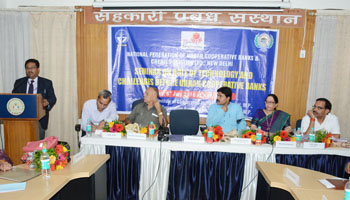Institute of Cooperative Management, Bhopal in collaboration with National Federation of Urban Cooperative Banks and Credit Cooperative Societies ( NAFCUB), New Delhi, organized state level seminar on “ Role of Technology and Challenges before Urban Cooperative Banks of Madhya Pradesh recently.
Seminar was inaugurated by Mr Ajay Michyari, Regional Director, Reserve Bank of India, Regional Office alongwith Mr H.K.Soni, General Manager Reserve Bank of India, Mr Surendra Singh Sisodiya, Chairman of M.P. state Urban Cooperative Bank Association, Bhopal and Director, NAFCUB, Mrs Alka Sriastava, Chairparson,Laxamibhai Mahila Nagarik Sahakari Bank, Ltd, Gwalior, and Director of NAFCUB, Mrs Arti Bisariya, Chairparson, Asthaa Mahila Nagarik Sahakari Bank, Ltd, Bhopal, Mr. Arun Singh Tomar, Chairman, Management Committee Bhopal, Sri Brijesh Shukla, Joint Commissioner, Cooperative Department, Govt of M.P. Mr Pradeep Nikhara, M.D. Apex Bank of M.P.
More than 55 delegates from 30 urban cooperative banks participated in the seminar. Mr Ajay Michyari, R.D. RBI said in his inaugural address that regulatory body has faith in urban cooperative banking system as they have wide reach in the society and can play good role in financial inclusion. But he stressed upon inclusion of technology in the banking system to give edge in competition with new players in same segment and also maximize the customer service and customer retention. He said that out of 51 urban cooperative banks in M.P. only 43 banks have implemented CBS system. He urged upon adopting new banking solutions like mobile banking, ATM, netbanking by urban cooperative banks.
Mr H.K.Soni, G.M. RBI said that percentage of deposit in UCBs in M.P. is Rs 1000 crore which is mere 0.5 percent of all India deposit by banks and same is true for advances also. He expressed concern that out of 51 cooperative banks in M.P. 13 banks are in C grade and 4 are in D grade. He also informed that 34 UCBs out of 51 in state are unitary branch bank. He felt inability to give permission for branch licensing as state government need to make certain amendment in state cooperative Act to enable RBI to help UCBs. He said that adoption of CBS is important for strengthening internal control system in banks.
Mr Surendra Singh Sisodiay, Chairman of M.P. state Urban Cooperative Bank Association, Bhopal said that percentage of NPA in urban cooperative banks are less in comparison with nationalized banks but still government did not help UCBs in reducing NPA by offering special schemes like OTS. He also urged RBI and cooperative department to allow UCBs to raise capital and give certain degree of autonomy for doing business. He said the cost of implementation of technology like CBS is cost intensive and also require special domain knowledge which is lacking in cadre of UCbs. Consequently despite the implementation of CBS banks are not getting requisite output. He requested RBI for uniform vendor system and also help weak banks in adopting technology by giving some sort of financial help.
Mr Subhash Gupta , Chief Executive NAFCUB said that he has organized this seminar under TAFCUB of RBI to sensitize and guide the UCBs of M.P. for scaling up their business and governance with leveraging the technology development.
Mr Piyush Pathak, faculty from Indian Financial Technology and Allied Services, New Delhi and Mr V Chaudhary, Tata Consultancy Services, Mr K.K. Mittal, faculty from Treasurance Training and Capacity Building, New Delhi spoke on seminar theme and guided the participants on various banking technology issues.
Dr. A.K. Asthana , Director ICM Bhopal said that technology integration is need of time not only for business organization such as UCBs but also for educational organization like ICM because our clientele and target groups are equipped with digital device and we have to take our business on their digital plateform. In this context he said that ICM Bhopal has given nation’s first mobile apps on “Cooperative Management” which is available on google play and window Market. He also expressed vote of thanks.
